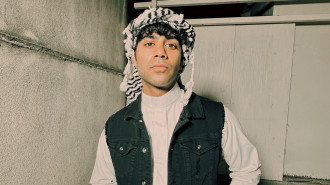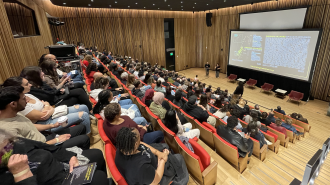
'We need accountability for all crimes committed by all actors in the occupied territory': Meeting Francesca Albanese, the UN's proxy Palestinian voice

The UN's Special Rapporteur on the Occupied Palestinian Territories, Francesca Albanese is known for her continued support for the Palestinian cause and their right to self-determination.
She has also gone on record calling out Israel's apartheid regime and is vocal in her support for the work of international NGOs in Palestine.
The New Arab sat down with Francesca shortly after a conference held at Rome's European Parliament offices and questioned the UN official on three topics: how upholding international law is a necessary precondition for political development, the importance of the Palestinian right to self-determination, and how best to facilitate the removal of illegal Israeli presence in Occupied East Jerusalem, the Occupied West Bank and the Gaza Strip.
Is it enough to talk about the "apartheid" character of the Israeli occupation, or should we rather look at apartheid practice as a constituent part of settler-colonial projects?
Apartheid is only one aspect of a broader colonial asset. It's important to talk about Apartheid because there's no doubt that it has been what Israel has been practising, at least from 1967 till now.
"If we are to overcome Apartheid, we need to implement, defend, and affirm the cruciality of Palestinian’s right to self-determination"
My UN mandate focuses on the occupied territories of the West Bank, East Jerusalem and Gaza. Israel's military occupation cannot be justified in perpetuity.
The Palestinians are suffering under a violent, merciless occupation for more than 50 years at the price of systematic discrimination and systematic military assaults. This is not to mention the absence of freedom of movement and the inability to access one's own resources.
Palestinian NGOs and institutions have called out Israel's apartheid regime long before B’tselem, Human Rights Watch and Amnesty International confirmed their observations.
But if we are to overcome apartheid, we need to implement, defend, and affirm the cruciality of Palestinian’s right to self-determination. This means affirming juridical elements as a prerequisite to any political element. Without the Palestinian right to self-determination as a precondition for negotiation, Palestinians would be negotiating under coercion.
Only after this precondition has been met will we start to see negotiations flourish and the Palestinian people begin to reclaim their freedom, as well as political and economic development.
Settler colonialism conceives the 'other' as a minority that pays the price for its own existence. Given this reality, how can the Palestinians have their own political identity recognised? What obstacles are in their way?
We are facing an asymmetry of forces on the land – we are not talking about a “conflict”, a conflict implies the presence of two similar entities confronting each other.
The Oslo Accords helped cement this asymmetric relationship by creating the illusion of a Palestinian state. In its current formation, the Palestinian state isn’t an independent sovereign state. It is an occupied, fragmented, one.
In fact, the Oslo agreements only provided the recognition of the domination over the Palestinians, neglecting the affirmation of anything like an actual Palestinian state.
As a jurist, I consider how the Oslo process hasn’t been an effective tool for self-emancipation. Despite that, I am convinced that without a Palestinian entity, without the withdrawal of the illegal colonies, without an affirmation of the Palestinians’ right to their lands and resources as conditio sine qua non for peace, both on a material and a formal level, no stable solution of the Palestinian question will be pursued.
|
Whatever Palestinians aim for their future, whether they demand a two-state or a one-state solution, the Palestinian right to self-determination must be honoured as the first step and there will be no way of acknowledging their sovereignty without going through this step. There must be no dependency on Israel on any economic or political level.
The withdrawal of any colonial outpost and the end of the colonial occupation or submission to Israeli law on their soil is something that must be implemented in line with international law – and it may require the use of measures prescribed by the UN Charter.
I affirm that the most important obstacle to the Palestinian existence is the presence of an acquisitive and repressive occupation on their land, which produces a humanitarian dependency on foreign aid and an economical dependency on the Israeli economy. This crisis is an inducted crisis and depends on the occupation preventing any form of local autonomous development.
"The most important obstacle to the Palestinian existence is the presence of an acquisitive and repressive occupation on their land"
Despite the growing acknowledgement of Israel’s crimes by civil actors, the international area remains unmoved. How do you explain this difficulty?
Unfortunately, despite a growing acknowledgement of the oppression of the Palestinians on an international scale, thanks to the work of NGOs and activists, this hasn't led to any major political changes in the institutional environment.
The “long-lasting friendship with the people of Israel” as many Italian and western politicians affirm often blindfolds them when it comes to being able to objectively scrutinise Israeli policies.
I wonder, though, which sort of friend is the one that promotes silence and censorship when one's behaviour is wrong? The effort to conceal Israel’s crimes and silence Palestinian voices is unprecedented. This censorship will never lead to any public acknowledgement of Israeli accountability, which brings total impunity along with an ongoing erasure of Palestinian rights.
The moment has come to stop being silent, there should be accountability for all crimes committed by all actors in the occupied Palestinian territory.
Impunity and protracted occupation aimed at seizing land and resources while confining the native population have led to the current state of apartheid – which continues to fragment, isolate, and disempower the Palestinian people, a people nowadays confronted with the risk of disappearing from the political map.
The crucial point is creating the conditions for Israel’s impunity to end, since the Palestinians are confronted with an inducted humanitarian crisis, that wouldn’t exist if they were given the opportunity for self-determination and independence.
Alba Nabulsi is a Palestinian-Italian journalist, lecturer, and translator based in Padua, Italy.
Follow her on Instagram: @nabulsi_girl_in_italy





 Follow the Middle East's top stories in English at The New Arab on Google News
Follow the Middle East's top stories in English at The New Arab on Google News


